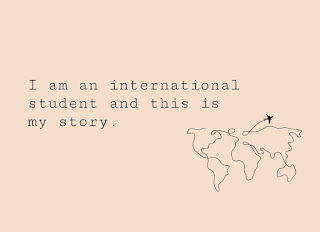Stuck in Between
For as long as I can remember, my friends and family have called me by my English name, Christine. I have always accepted this name. It is the name that I look for at the souvenir shop, and the name I tell the Starbucks barista as I order my daily cups of coffee. However, whenever I go by Christine, a sense of hypocrisy haunts me ever so often. “Christine” is not my real name. “Christine,” for lack of better words, is my preferred name. My legal name is 詩涵 (Shih-Han), a name that elegantly translates to “poetry” and “forgiveness” in Chinese. But for the longest time, I felt like this name didn’t belong to me. Or rather, I didn’t belong to my name.
I was born in Taiwan and raised in Mainland China. Growing up, I attended an international school immersed in western education, mainstream media, and ideologies. For the most part, I feel incredibly lucky to call myself a bilingual speaker in English and Mandarin. Throughout my formative years, my classmates and friends are from every corner of the world and my teachers spoke English. Many would say I’m lucky to have grown up in such a vivid environment, but prior to accepting what seems like a multidimensional childhood, I have always been haunted by the perpetual question of where I stand in this diverse mix of cultures. In short, I felt like I was both Christine and 詩涵 but never enough to be both.
It was a common 6th-grade Humanities class that sparked my query. One day as I walked into the classroom, I saw giant writings fly across the whiteboard, “What is your cultural identity?” I recall, as a 6th grader, I weakly defined culture as “where I come from,” and identity as “who I am.” But I was unable to connect the two. Where I come from does not seem to completely answer who I am. I was at a loss and gradually became incredibly frustrated that I was incompetent to fathom an answer to that one simple question. It was since then that I have invested myself in exploration to the ultimate answer to that question.
I recognize Taiwan as where I come from. But was who I am built upon where I come from geographically? I am disconnected from the Taiwanese culture, frankly because I did not grow up there. Even though I grew up in Mainland China, the people and culture I’m exposed to are still very different from the ones my parents recognize and passed down to me. I affiliate myself with the western cultures and my English name but that is not where my roots reside. As time passes, a collective absence of identity and belonging has stressed me. Not until later in high school was when the expression of Third Culture Kids (or TCK) surfaced in my vocabulary.
TCKs are individuals who spend most of their formative years in a culture other than their parent’s culture. Because of that, they “develop a sense of relationship to all of the cultures while not having full ownership in any” (Fail et al). A sudden epiphany emerged in me. These three words were the missing pieces to my identity puzzle. For the longest time, I longed for belongingness, either in my parent’s Taiwanese heritage, my Chinese community, or my Western environment, but only to end up feeling marginalized in all and never fitting in in any. However, in the research article, “Belonging, Identity, and Third Culture Kids,” Fail et al states that for TCKs, “elements from each culture are incorporated into [their] life experience, but the sense of belonging is in relationship to others of similar experience” (Fail et al). Now that I’m in college, I’ve met numerous people that are like me - Third Culture Kids who have been stuck in between. And to my surprise, there are more of us than I realized. While most of us have struggled with our identities and the idea of fitting in, one thing that we all acquire is our awareness of the world, of different cultures. In the research article “Developing Identity Among Third Culture Kids,” the qualitative research that consists of 6 different TCKs, demonstrates that because TCKs have a relatively broader world view derived from their experiences, we feel more connected to the broader global community (Rustine). Because of our multilayered childhood and often-shifting situations, we fit in everywhere instead of nowhere.
Now, I cease to understand cultural identity as who I am in regards to where I come from, but rather what I have absorbed and carried with me throughout my life. I understand now that I am my own cultural identity; a mixture of colorful ideas and perspectives that are still broadening over time. Every person I encounter and every place I travel to, add to my own cultural identity. I am fortunate to have connected with friends and mentors from different backgrounds and learned from them. I am grateful for my parents and all they have taught me about my roots. Because of this, I am a part of the TCK community, a citizen of everywhere and nowhere. I am building bridges between cultures, a Third Culture Kid, following in the footsteps of internationalization.
Works Cited:
Fail, Helen, et al. “Belonging, Identity and Third Culture Kids: Life Histories of Former International School Students.” Journal of Research in International Education, vol. 3, no. 3, Dec. 2004, pp. 319–338, doi:10.1177/1475240904047358.
Rustine, Amy Carol, "Developing Identity Among Third Culture Kids." Georgia SoutherUniversity Honors Program Theses, no. 373, 2018, https://digitalcommons.georgiasouthern.edu/honors-theses/373

Comments
Post a Comment